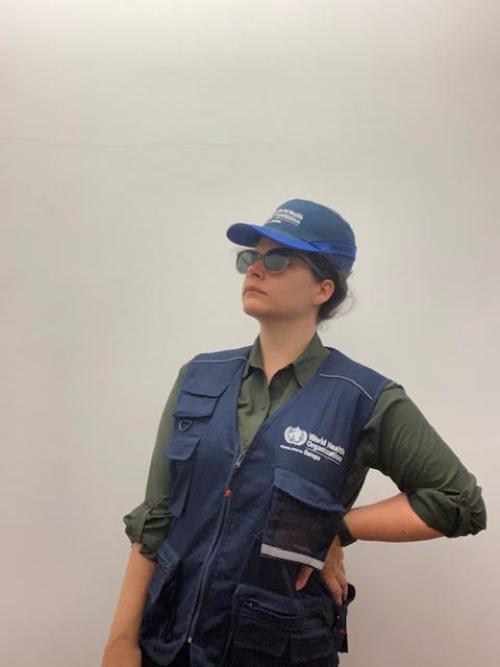For Dr. Jeni Stolow, relief for Ukraine has become a personal mission

It’s been almost exactly one year since Russia invaded Ukraine (Feb. 24, 2022), and despite some moments that have inspired optimism, there’s currently little indication a resolution is coming anytime soon.
The impact of the conflict has been severe. According to the United Nations’ human rights office, there have been 7,199 civilian deaths and 11,756 wounded since the conflict began.
In addition, Reuters reports that at least 15,000 Ukrainian citizens are missing or unaccounted for.
Clearly, the human rights violations don’t end with deaths or injuries. And the needs for assistance don’t end there either.
Dr. Jeni Stolow (CHS MPH ’16, PhD ’20), assistant professor in the Department of Social, Behavioral, and Population Sciences at the Tulane School of Public Health and Tropical Medicine answered the call for assistance.
Stolow returned last fall from a deployment to Eastern Europe as a World Health Organization (WHO) risk communication and community engagement (RCCE) officer.
Stationed in Krakow, Poland, for three months with other public health professionals from WHO, the European Centre for Disease Prevention and Control, Doctors Without Borders, UNICEF, and the United Nations High Commissioner for Refugees (among others), Stolow worked with a group that was called the refugee health extension.
The goal was to help house Ukrainian refugees while managing the needs of Eastern Europe, including Poland, Moldova, Czechia, Ukraine, Hungary, Romania, Slovakia, Germany, Belaruse, and Bulgaria.
“A lot of what my work was doing was gauging needs and being like, what do you need? Who are you? Where are you going? Where do you come from? What are your concerns? Is health even a concern? And what do you need? And that was a lot,” Stolow said. “Because those are millions of people. Which is why we work with communities and organizations and ministries of health, regional offices, all of these people who are tapped in. But we also had to acknowledge that these were millions of people coming into countries, which is great that they were welcomed into countries, but that's a huge ask of an already burdened system.”
Specific tasks for Stolow’s group included interviewing people and assessing health needs, and then making sure those needs were met. With such a huge group of people to deal with, that was no small task.

How did they do it? Stolow credited communication.
And coffee.
“A lot of coffee,” she said. “It always started with a team meeting. And so all of us sitting at the table and debriefing one another, right? Because the whole idea was you have expertise across organizations, collaboration across organizations, as well as real time ability to [distribute information].
Stolow, who has been responding to the COVID-19 pandemic as the Global Outbreak Alert and Response Network (GOARN) research focal point for risk communication and community engagement, brought that experience into the work as well.
“[There were] a lot of cases and it's COVID still existing,” Stolow said. “Tourism season was in boom, and the rise of tuberculosis, measles, mumps, rubella, monkey pox; everything was happening. And so we were trying to be a supportive band aid for making sure that the refugees were supported, had what they needed, but also weren't being perceived as a burden in the countries they were going to because we know that always will happen. It's just a matter of time.”
Skills that continue to be in demand in that region include the very skills students tend to acquire at SPHTM. Namely, being able to synthesize lots of information from varying points, determine the most relevant pieces, and then relaying that information to diverse audiences.
But moreover, Stolow is encouraged by the empathy today’s students have as well.
“That makes me feel so excited for this new generation of public health practitioners that are focused on health equity, on accessibility, on capacity building and sustainable change, as opposed to top-down helicopter [approaches],” she said. “It's great to see that the messages that we're seeing in the classrooms are exactly what we're looking for in the field. Is this a new age of sustainable, meaningful, inclusive public health? That's cool to say.”
“It's great to see how we can talk about the issues,” she added. “The many issues that we've been going through over the last few years and see how determined people are for actual change, instead of just nice words and a band aid.”
